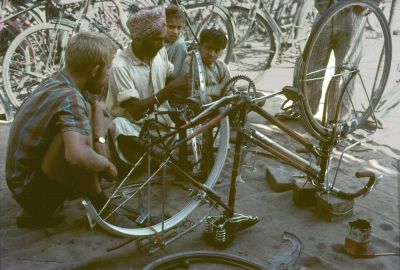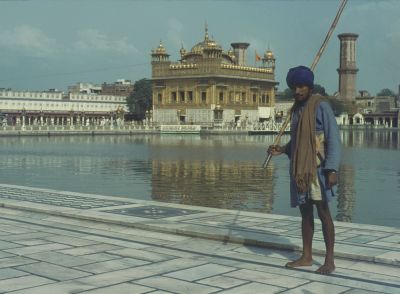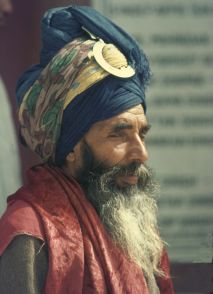| Barelds - Cycling around the world - Cycle stories - Asia, Africa, Europe, America | ||||||||||||||||||||
| home | site map | world | children | recent | cooking | dutch | german | react | ||||||||||||
South-East Asia 1968 (7).

India: A Sikh bicycle repairer, by whom Henny had his spokes tensioned and his bicycle checked with confidence.
I
t was the time of the Holi-festival, feast of the goddess of fraternisation. On that day there are no caste borders and that is being celebrated exuberantly by hugging and pouring paint onto each other abundantly. We left that morning before dawn to avoid the revelry of the big city. We cycled undisturbed through the villages on our way. In a tea house a man asked us "Please allow me to spray you" and we got a blob of red paint.We had to wait for the railway gates. The train approached us slowly and a cheering crowd armed with spray guns and buckets full of paint came towards us. "Do you speak English?" Henny asked a passer-by. "Yes". "Well tell those people who are coming towards us, that this is not fair, we cannot go any further, there are hundreds of them to fraternise with us". The man conveyed our message and to our surprise the red coloured crowd stopped. When gates opened they dashed away towards us and so did we. However, we did not evade our ration of paint. That afternoon, when we cycled through the narrow streets of Mirzapur we got the full blow, they threw buckets full of paint at us but fortunately they estimated the speed of the bicycle wrongly. That night we showed up very colourful.
In a teahouse we just had eaten a solid portion of parathtas (a kind of pancakes) and were resting on a camp bed, when a white man got out of a car. He was sweating and looked very miserable. "Have you eaten there?" he said full of abhorrence. "No I stick to cola and biscuits, much safer". "Come on", we said, "these delicious parathas are freshly baked and go straight to your plate and the tea is freshly made". "Parathas, never heard of" the young man said, who had lived in India for a long time and had been ill quite frequently. "No wonder, then you had better not eat biscuits" we said laughing and cycled on cheerfully. We seldom suffered from diarrhoea, although we drank all sorts of water, because at temperatures of around 35° C (89,6° F) you become so terribly thirsty that you don't ask anything. Obviously your body seems to build up a good resistance.


India; the golden temple was "well " guarded by Sikh warriors in traditional military equipment, but with a disarming roguish look.
In the evenings we could make up for the "damage" if there was a good cook at the dak bungalow, although we often had to wait a long time. First he had to go to the market, to buy a chicken, than pluck it and before the chicken curry was ready, many hours had passed. "Ha, I can hear the rattle of the dinner set", I often wrote in my letters home.
In Amritsar, the capital of the Sikhs, a separate sect of Hinduism, we slept in a dharamsala. These are guest rooms of the temples where everybody can sleep. We had never used this possibility because you never had a room for yourself, where you could put your gear. But here in Amritsar they had them. By the way the corridors were full of pilgrims lying on the floor because they didn't have that many rooms and dormitories. A Sikh arranged next to our door his sleeping place: he unscrewed his artificial leg and put as a pillow under his head, just like we did when we took off our clothes and used these as a pillow!
| World around (nl) | South-East Asia | << Previous | Part 2 >> | |||
| Barelds on bicycle through the world - Cycling in Asia, Europe, Africa, America | ||||||